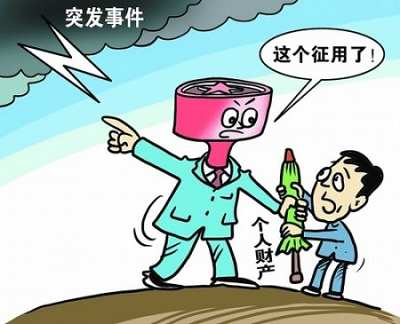Local gov't mulls law to use property
A draft regulation aimed at relief facilitation in times of emergencies is not sitting well with some people, as it would allow authorities in Sichuan Province to use citizens' private property under certain vague circumstances.
 |
|
Local gov't mulls law to use property |
The process of soliciting public opinions on the draft is due to end today, officials said.
The draft states that governments at and above the county level in the province are entitled to requisite properties from organizations or individuals in order to handle emergencies, which refers to events that result or may result in serious danger to the public, such as natural disasters, accidents, and incidents that could affect public health or social order.
The pending law also says that requisition certificates should be issued and "reasonable compensation" given if private property is damaged or lost.
The Sichuan Legislative Affairs Office, which drew up the draft, released a statement online Wednesday in an attempt to defend the controversial article.
The draft is in line with China's Constitution, the Property Law, the Emergency Response Law and the National Defense Mobilization Law, the statement says.
The draft emphasizes the 13th article of the Constitution, which stipulates that the lawful private property of citizens is inviolable, but "the state may, in the public interest, appropriate or requisition private property of citizens for its use in accordance with the law, while making compensations," according to the statement.
Zheng Weiqiang, a press officer of the Sichuan provincial government, told the Global Times that the plan is aimed at improving local governments' ability to handle emergencies.
The draft is meant to facilitate relief works in disaster-stricken areas, for instance, to contain food and daily commodity prices in emergency situations, according to Yao Huanqing, deputy director of the Research Center for Civil and Commercial Law at Renmin University of China, adding that it is consistent with the Property Law.
However, he cautioned that corruption and misconduct may occur if the law isn't made transparent.
"In order to avoid misconduct, the government should specify the details of the process in taking over private properties. And the government should clarify the definition of emergency situations to keep the public informed," Yao said.
Neither the draft nor the latest government statement indicates how to define "emergencies" or what type of authorities or organizations would have the right to wield such power.
 0
0 






